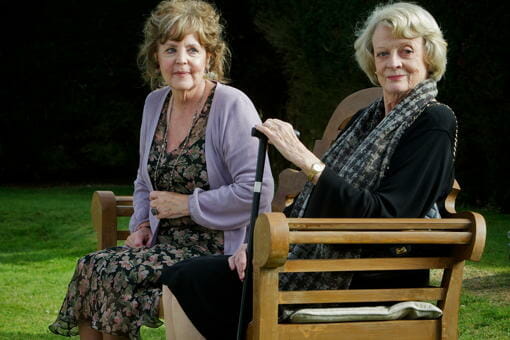By Meredith Alloway · November 5, 2012

It’s about time Dustin. We’ve been waiting for the moment when you’d step behind the camera. Like other actors of his time, Clint Eastwood, Mel Gibson and Ron Howard to name a few, he’s trying his hand at directing. His directorial debut Quartet is loaded with legendary actors, backed by super-producers the Weinstein Co. and is a lovely, well-rounded script. If the film is any proof of Hoffman’s future as a director, we should be excited.
Quartet finds its setting in a retirement home for opera singers and musicians. Choral singing, violin playing and piano plunking keep the British estate a buzz. No matter that the average age of its residents is nearly 80. We’re introduced to legendary opera singer Wilf (Billy Connelly) who occupies the “dirty-old-man” role. He flirts with the nurses and maids on site and this romance is clearly the way he maintains his youth. His best friend Reginald (Tom Courtenay) is slightly more reserved. Perhaps the most childlike of them all is Cissy (Pauline Collins) who is consistently listening to music on her Walkman.
They live a calm, consistent lifestyle at the home, reminiscing about their past fame. But when the fourth member of their renowned quartet Jean (Maggie Smith) moves in, Reginald’s world is shaken.. An ambiguous romance has taken place in Reginald and Jean’s past and it’s scarred them both. When jean first sees Reginald she says, “I’m sorry I hurt you. We were different people then.” But he’s reluctant to accept her apology.
The home conducts an annual gala to benefit its operation, and this year its director Cedric (Michael Gambon) is set on bringing back the Quartet. All members are supportive except for, of course, Jean. She finds the offer offensive. “I may crack on the high notes,” she tells her colleagues. She refuses to tarnish her reputation.
The film explores the uncomfortable both also liberating aspects of aging. As Billy Connelly told the LA Times, “It teaches older people to stop being old.” The residents of the home are surprisingly cheerful and still find the same happiness in music as they did years ago. But they also struggle both internally and externally to keep their operatic and instrumental passion alive. Reginald, in a poignantly educational scene, teaches a group of students what “opera” is. He tells a young black man, “In opera, when a man is stabbed in the back, he sings. In rap, he talks and sometimes even with rhythm and feeling.” It gives both Reginald and the audience hope that true music will live on.
Hoffman finds ways to illuminate, like this instant, every single scene. No rock goes unturned or moment unmissed. His sense of humor shines through every character and their motivations. The story, without his point of view, could easily be maudlin. The fault that most people make, and will make when reading about the film, is associating growing old with sadness. Quartet fights this tendency with iron fists.
In an interview with Hoffman after the film’s premiere, he discusses when he first read the script. Another director was attached and pulled out last minute. Was Hoffman up for the challenge? Absolutely. He was fascinated with exploring his own age. “Do what you know” he professes. He’s entering his 70s and is inspired by what challenges may come.
It’s a film all ages should see, especially those of us who are young. We’re forced to observe and ultimately understand a part of society that normally goes unexplored. Rarely do filmmakers make movies about “old people.” It’s sad, but true. Hoffman isn’t doing anything revolutionary with the camera. Sometimes the cinematography is cliché and the story predictable, but the characters are luminous. To be able to work with such masterful actors as Maggie Smith and Billy Connelly, Hoffman should be given credit. He pulls amazing performances out of his cast.
And it’s not till the credits roll that you realize all but the Quartet aren’t actors at all. They’re real-life retired musicians and singers. Their presence in the film is proof in itself that aging shouldn’t stop you from making your art or doing what you love.